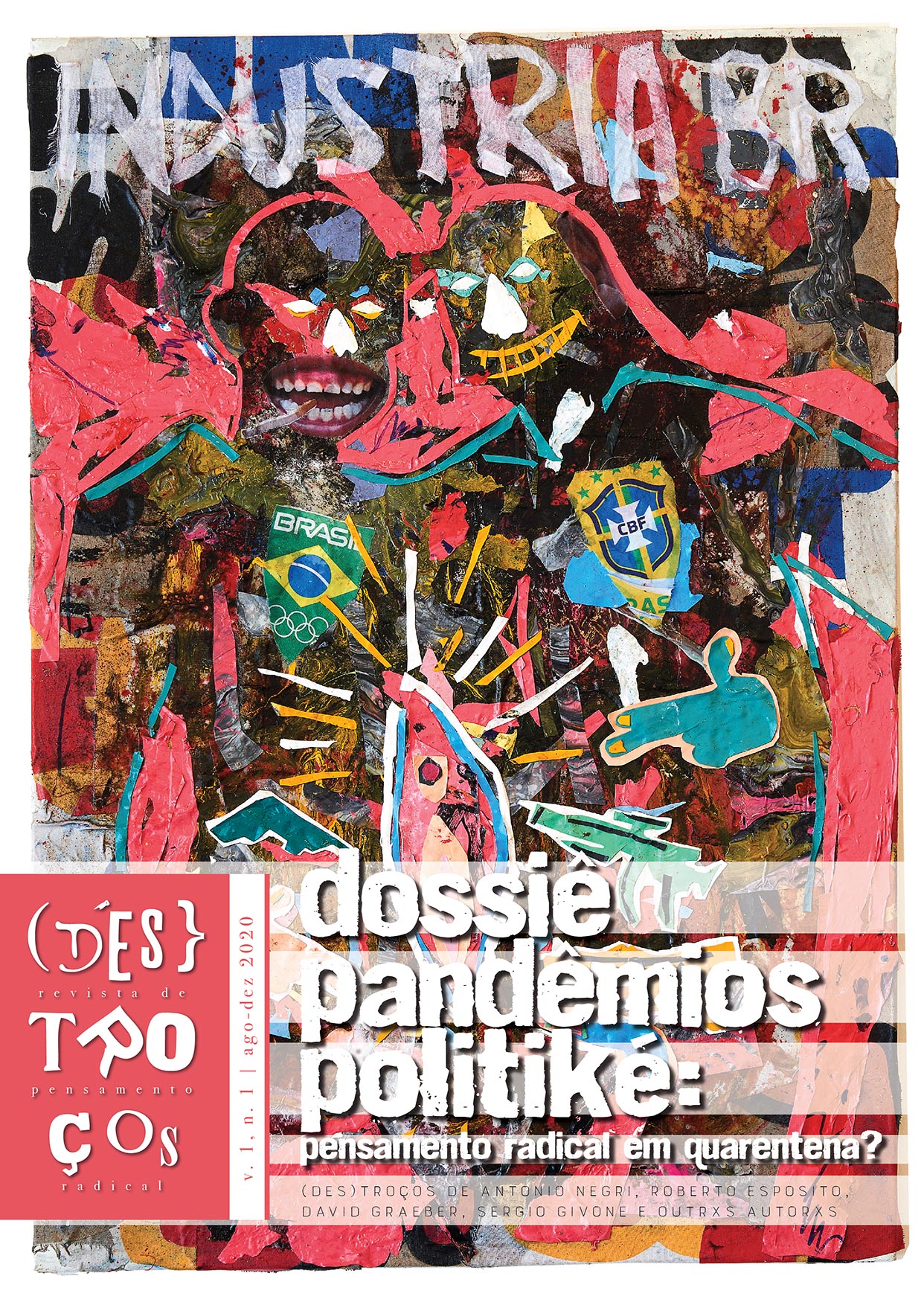Published 2021-01-25
Keywords
- civil disobedience,
- state of exception,
- permanent economic state of exception,
- nonviolence,
- political action
How to Cite
Copyright (c) 2021 (Des)troços: journal of radical thought

This work is licensed under a Creative Commons Attribution-NonCommercial 4.0 International License.
Abstract
This paper proposes a rupture of the dogmatic thought about civil disobedience. Nowadays, the economic state of exception has become the rule and the daily emergency of disaster established by capitalism can only be overcome, more than by a new nomos of the Earth, by the deactivation that only the radical refusal of the disobedience can constitute. Therefore, the civil disobedience, more than a mechanism of self-correction or even of self-integration of the constituted law, is a way to escape from the total submission created by the late capitalism, when the contemplative subjectivation guaranteed by the society of the spectacle is justified and maintained together with the legalized and institutionalized violence characteristic of the permanent economic state of exception.
Downloads
References
- AGAMBEN, Giorgio. Estado de exceção. Trad. Iraci D. Poleti. São Paulo: Boitempo, 2004.
- AGAMBEN, Giorgio. Entrevista concedida a Flavia Costa. In: AGAMBEN, Giorgio. Estado de excepción. Homo sacer, II, I. Trad. Flavia Costa e Ivana Costa. Buenos Aires: Adriana Hidalgo, pp. 9-20, 2005.
- ARENDT, Hannah. On civil disobedience. In: ARENDT, Hannah. Crises of the republic. New York: Harcourt Brace, pp. 49-102, 1972.
- BENJAMIN, Walter. Para uma crítica da violência. In: BENJAMIN, Walter. Escritos sobre mito e linguagem (1915-1921). Org., apresentação e notas Jeanne Marie Gagnebin. Trad. Susana Kampff Lages e Ernani Chaves. São Paulo: Duas Cidades/Editora 34, pp. 121-156, 2011.
- DERRIDA, Jacques. Força de lei. Trad. Leyla Perrone-Moisés. São Paulo: WMF Martins Fontes, 2010.
- DOUZINAS, Costas. Philosophy and resistance in the crisis. London: Polity, 2013.
- DOUZINAS, Costas. Crisis, resistencia e insurrección: el despertar de la izquierda radical en Grecia. In: VV. AA. Posdemocracia, guerra monetaria y resistencia social en la Europa de hoy. Madrid: Errata Naturae, pp. 163-185, 2015.
- EBERT, Theodor. Die Auswirkungen von Aktionen zivilen Ungehorsams in parlamentarischen Demokratien: eine vergleichende Betrachtung. Widerstand im Rechtsstaat: 10. Kolloquium der Schweizerischen Akademieder Geisteswissenschaften. Freiburg: Universitätsverlag, pp. 73-116, 1988.
- ESTÉVEZ ARAUJO, José. La constitución como proceso y la desobediencia civil. Madrid: Trotta, 1994.
- FERREIRA, Bernardo. O risco do político: crítica ao liberalismo e teoria política no pensamento de Carl Schmitt. Belo Horizonte: UFMG, 2004.
- GALLI, Carlo. Genealogia della politica: Carl Schmitt e la crisi del pensiero politico moderno. Bologna: Il Mulino, 1996.
- LAUDANI, Raffaele. Desobediencia. Trad. Mario Trigo. Barcelona: 2012.
- SCHMITT, Carl. Der Nomos der Erde im Völkerrecht des jus publicum europæum. Berlin: Duncker & Humblot, 1974.
- SCHMITT, Carl. Legalidade e legitimidade. Trad. Tito Lívio Cruz Romão. Belo Horizonte: Del Rey, 2007.
- SCHMITT, Carl. Teología Política. Trad. Francisco Javier Conde e Jorge Navarro Perez. Madrid: Trotta, 2009.
- SCHMITT, Carl. La dictadura: desde los comienzos del pensamiento moderno de la soberanía hasta la lucha de clases proletaria. Trad. José Díaz García. Madrid: Alianza, 2009.
- SCHMITT, Carl. Catolicismo romano y forma política. Trad. y notas Pedro Madrigal. Madrid: Tecnos, 2011.
- VALDECANTOS, Antonio. La excepción permanente: o la construcción totalitaria del tempo. Madrid: Díaz & Ponz, 2014.

